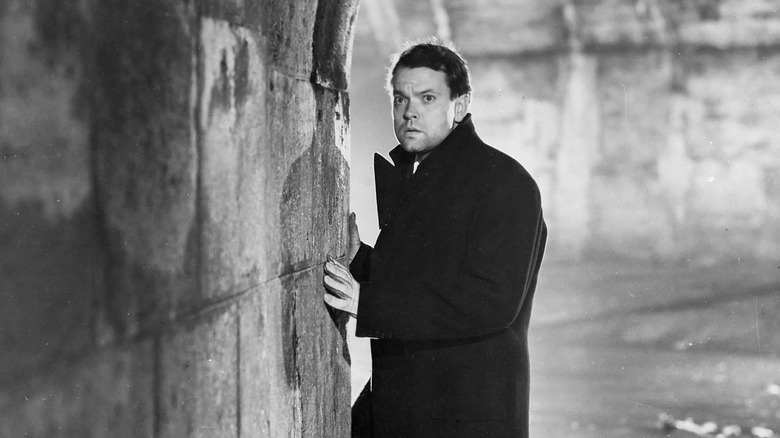
Harry Lime in "The Third Man" is one of cinema's greatest villains and certainly not the kind of person you'd want to spend much time with in real life. He's a sociopathic black marketeer whose cynical line in diluted penicillin causes untold suffering and death to his many child victims. Yet, played with typical charm and devilment by Orson Welles, he is simply irresistible. Even on repeat viewing with full knowledge of his heinous activities, it's impossible not to be captivated by him from the moment he first appears in a doorway with an incorrigible smirk spread across that big moon of a face.
Lime is onscreen for less than 10 minutes but he may be Welles' greatest performance as an actor, tapping into the elusive enigma of the multi-faceted artist and self-proclaimed charlatan. After leaving the U.S. for self-imposed exile in Europe in 1947, he took the role for money, a resource he desperately needed for his passion project, "Othello." Despite his initial lack of enthusiasm, it was the role he was born to play and it gave him international adoration, something that evaded him on home soil due to his reputation as a difficult troublemaker.
During his lengthy spell in Europe, Welles pursued a wide range of projects, many of them unfinished. He made travel documentaries, ballet and theater productions, and bold adaptations of Shakespeare, Herman Melville, and Franz Kafka. Yet Harry Lime shadowed his footsteps throughout his career and he grew to detest Anton Karras' theme to "The Third Man" (via "Orson Welles Over Europe"). Even so, it was Harry Lime who gave him the chance to begin his long-running relationship with the British public and a prequel radio serial called "The Adventures of Harry Lime," following the character's exploits before his death in the sewers of Vienna.
The Origins Of Harry Lime
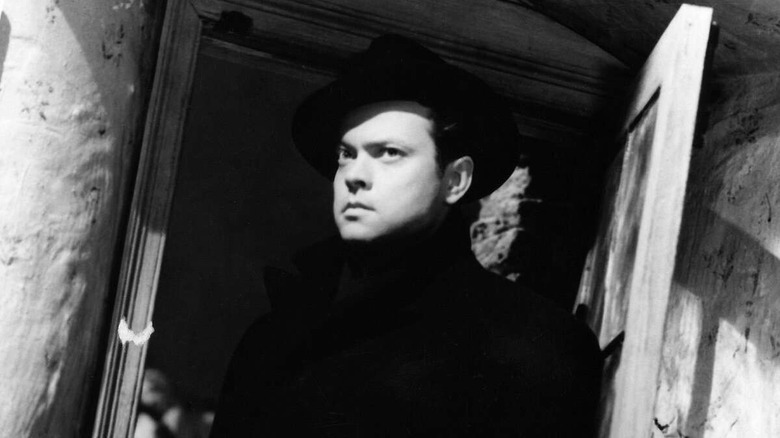
Graham Greene was already a celebrated novelist and travel writer by the time he was hired to write the screenplay for "The Third Man." His most famous works incorporated themes of guilt, betrayal, and intrigue, elements that played a huge part in the novella he wrote in preparation for his scriptwriting duties on Carol Reed's classic noir.
Following Holly Martins (Joseph Cotten), a pulp writer investigating the recent death of his old friend Harry Lime (Orson Welles) in post-war Vienna, it later turned out that there may have been something more personal to their relationship for the writer. A few years after the film was released, two British diplomats left London and emerged again in Moscow (via Observer). They had been spying for the Soviets for 20 years before a tip-off from a third man helped them narrowly escape arrest. Suspicion fell on Kim Philby, a senior member of MI6 whose job it was to spy on the Russians, not the other way around.
Graham Greene had a strong personal connection with Philby. He worked under him for the Secret Service during the Second World War and remained in contact even after Philby also defected to Moscow. Greene had quit the service after Philby offered him a promotion, leading some to believe that the author had suspicions about his friend. His biographer, Norman Sherry, claimed the author once said that if he'd known Philby was a spy, he might have given him a 24-hour head start before reporting him.
Was "The Third Man" Greene's warning to Philby? Either way, there are fascinating parallels between Greene and Philby and Martins and Lime. As Ron Rosenbaum of the Observer wrote:
"Beneath the surface of 'The Third Man,' the great spy novelist of the century is wrestling with himself over the great spy of the century."
Harry Lime Takes To The Airwaves
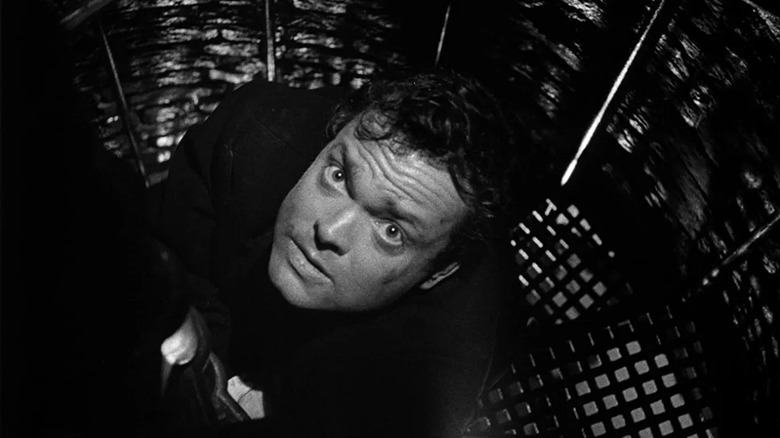
"The Adventures of Harry Lime" was the brainchild of notorious British producer Harry Alan Towers. Towers was a shady character himself; in the early '60s, he was accused of spying for the Russians and skipped bail in the U.S. after being charged by the FBI for running a vice ring (via The Guardian). Before that, he produced a number of successful radio shows. Among his credits are "Horatio Hornblower" with Michael Hordern in the lead role and a series of "Sherlock Holmes" adventures with a cracking cast. John Gielgud starred as the famous detective, Ralph Richardson as Watson, and none other than Orson Welles played Professor Moriarty.
Bringing Welles' celebrated character from "The Third Man" to British radio was a stroke of good fortune for Towers. He shared the same agent as Graham Greene and through this mutual contact found out that while the author had sold his novella to the film's producer, he hadn't sold the rights to its eponymous villain. Towers snapped up the rights and put "The Adventures of Harry Lime" into production.
Welles reprising his role was a great casting coup for Towers. Welles was no stranger to radio, of course; after making his name on stage during the '30s as a precociously talented teenager, he gravitated towards radio work, eventually taking his Mercury Theater troupe to the airwaves. Their most infamous production was the notorious adaptation of H.G. Wells' "The War of the Worlds," in part recorded to sound like a live news report of a Martian attack. The broadcast caused panic and gave an early indication of Welles' tendency for mischief (via The Hollywood Reporter); just watch the press conference where he apologizes for all the hubbub with barely concealed glee.
Why Was The Adventures Of Harry Lime Popular?
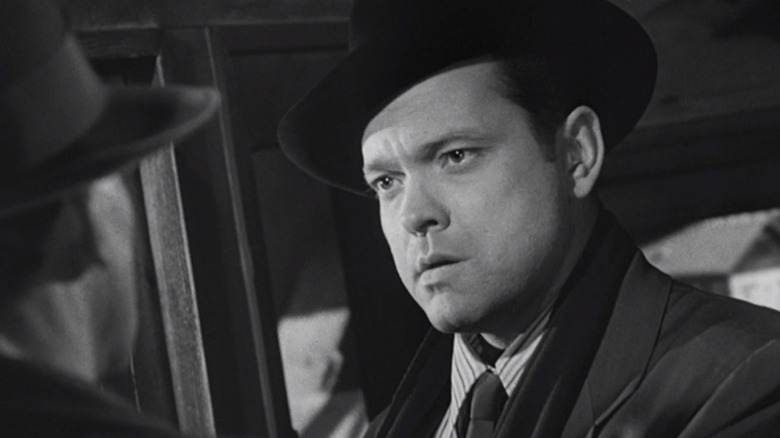
"The Adventures of Harry Lime" proved popular in Britain and it's easy to surmise why. After the hardships of World War II and rationing still in place until the mid-'50s, it offered racy escapism that must have felt so exotic and alluring to the listening public. In the '50s, only seven percent of the population had the means or desire to holiday abroad (via Retrowow), with the rest taking their vacations on the good old British seaside or holiday parks like Butlins or Pontins. The former's owner, Billy Butlin, offered "a week's holiday for a week's pay" but it was a far cry from the excitement of foreign travel -- something that wouldn't become a reality for many until the boom in package tourism in the '60s and '70s.
For a nation used to braving temperamental British summers while making the best of it with crowded beaches, Kiss-me-quick hats, Glamorous Granny and Knobbly Knees contests, the adventures of the disreputable but urbane and well-traveled Harry Lime must have seemed wonderfully cosmopolitan. With his extensive CV of criminal activities including extortion and bank robbery, each episode took him from Budapest to Naples, New York to Tangier, Mexico to Paris, hovering in the same twilight zone as "The Third Man" where a place was simultaneously seedy, glamorous, romantic, and dangerous.
As a guide to these far-flung locales, who could be a better companion than Orson Welles? He himself had a passion for travel, having toured Europe with his father in his teens (via "Orson Welles Over Europe") and he was very different from the cozy stars of British radio of the time. Harry Lime was cunning, confident, quick-witted, and always one step ahead with his latest scheme. Welles could play him in his sleep, purring through each episode with that magnificently luxuriant voice of his.
Orson Welles And His Relationship With Harry Lime
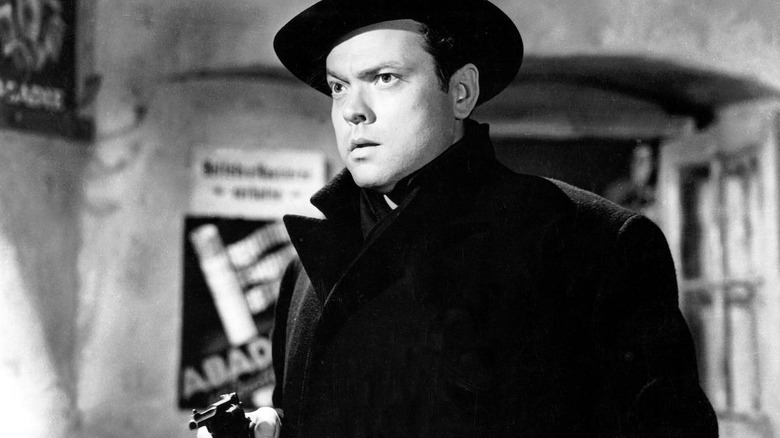
52 episodes of "The Adventures of Harry Lime" were produced, further associating the character in the public's mind with Anton Karras' jaunty yet sinister theme tune. The musician's involvement itself was a happy accident; director Carol Reed discovered Karras in Vienna and his score became synonymous with "The Third Man," the radio show, and Harry Lime himself.
As much success as Harry Lime brought Orson Welles, he developed a dislike for the character. While discussing "Mr Arkadin," a wonky film inspired by an episode of "The Adventures of Harry Lime," he told Peter Bogdanovich (via Wellesnet):
"Arkadin is closer to Harry Lime, because he is a profiteer, an opportunist, a person who lives off the decay of the world, a parasite that feeds off the universal corruption of things, but he doesn't attempt to justify himself, like Harry Lime, by thinking himself a sort of 'superman...' It's only Arkadin's ideology, which is detestable, but not his mind, because he's courageous, passionate, and I think it's really impossible to detest a passionate man. That is why I detest Harry Lime: he has no passion, he is cold; he is Lucifer, the fallen angel."
Welles' assessment of the character was perhaps a little off, at least as far as the radio show was concerned. Lime was softened considerably from the nihilistic racketeer who thought nothing of maiming children to make a buck, often providing a weirdly off-kilter moral center to the underworld that he navigates with such aplomb. He also cuts a strangely romantic character in some episodes, left contemplating what might have been with the latest potential love interest he comes into contact with. He certainly doesn't come across as cold or passionless. But then again, Orson Welles said a great many things, delighting in the fact that a significant number of them were all part of the illusion.
Read this next: The 14 Best Noir Movies Ranked
The post How Orson Welles Reprised His Role in The Third Man For A Prequel Radio Show appeared first on /Film.
0 Comments